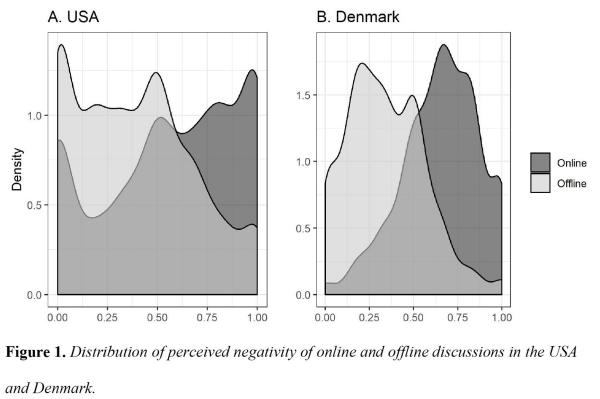People "predisposed to online hostility", and how to contain them
Are social media worst than real life? It’s complicated.
Online political discussions are perceived as more toxic than offline political discussions. But is it true?
The key findings of a research on this topic published in 2019 were summarized on Twitter, and these are the ones I personally find more interesting:

One of the charts of the complete research
</em></u>
- Surveys from the US and Denmark document that people at large do indeed perceive online environments as more hostile than offline. [But…]
- Do online environments induce hostility because nice people are less able to regulate their emotions online? NO. People who report that they are hostile online also report that they are hostile offline. There are no differences across the two context.
- Are online environments hostile because the setting is attractive to those predisposed for hostility? NO. Hostile people (e.g., status-obsessed individuals) talk about politics whenever they can. However, non-hostile individuals do opt out of online debates.
Why the gap, then?
If the bullets above are true, why do “people at large perceive online environments as more hostile than offline ones”? The authors of the study conclude that this “hostility gap” seems to reflect that the public nature of online discussions exposes people to way more hostile attacks directed against strangers. Offline, these are hidden to the public eye. Online, instead, by being easy (or unavoidable) to see, they shape the overall perception. In other words, if I understand it well, this is something similar to what happens with the perception of the number of immigrates in Italy and many other “first world” countries.
Contain trolls? OK. But how?
The solution, say the authors, would be “to contain” the people who are for whatever reason “predisposed to online hostility”. Easier said than done, isn’t it? No, wait. Maybe it is simple, at least to explain. Maybe the solution, or at least two big parts of it, may be in:
- outlawing instantness in social networks
- and, in any case, move right away to the personal websiteverse
Who writes this, why, and how to help
I am Marco Fioretti, tech writer and aspiring polymath doing human-digital research and popularization.
I do it because YOUR civil rights and the quality of YOUR life depend every year more on how software is used AROUND you.
To this end, I have already shared more than a million words on this blog, without any paywall or user tracking, and am sharing the next million through a newsletter, also without any paywall.
The more direct support I get, the more I can continue to inform for free parents, teachers, decision makers, and everybody else who should know more stuff like this. You can support me with paid subscriptions to my newsletter, donations via PayPal (mfioretti@nexaima.net) or LiberaPay, or in any of the other ways listed here.THANKS for your support!